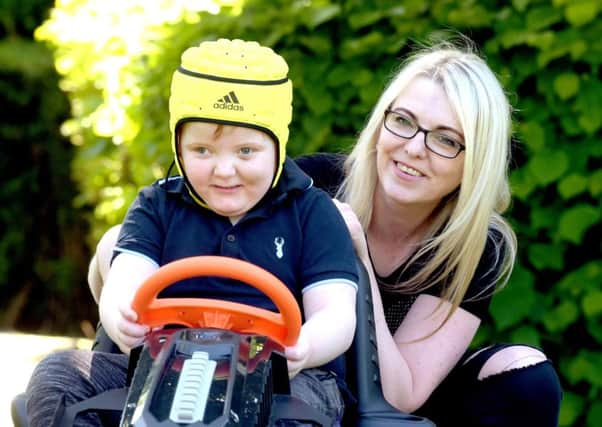Government will review ban on cannabis for medicinal use


Mr Javid announced the move in a statement to the House of Commons yesterday in the wake of a series of appeals from parents, including Karen Gray from Edinburgh, whose five-year-old son Murray, suffers from severe epilepsy seizures.
But he ruled out any move to legalise the use of cannabis for recreational purposes, despite widespread calls to allow even greater access to the drug.
Advertisement
Hide AdAdvertisement
Hide AdSeveral parents, including Mrs Gray, have appealed for their children to be able to access medications which can alleviate epilepsy and a range of other illnesses. Former justice secretary Kenny MacAskill, SNP MP Tommy Sheppard and Liberal Democrat MSP Alex Cole-Hamilton joined a host of voices, including Tory peer Lord Hague, in calling for the drug to be fully legalised.
The Home Secretary also announced he had authorised a licence to be issued for six-year-old Alfie Dingley after the boy’s mother said she had been waiting three months for Prime Minister Theresa May to fulfil a personal assurance that he would be allowed to receive cannabis oil.
But speaking to the House of Commons, Mr Javid stressed that the class B drug would remain banned for recreational use.
Mr MacAskill said: “I support legalisation of cannabis.
“Laws have to have public support as well as public merit. This has neither.
“Medicinal cannabis has merit and recreational cannabis is now becoming normal for a great many and seeking to criminalise them is wrong.
“Canada has legalised medicinal since 2001 and is legalising all [uses] in a few months’ time. Society has neither collapsed, nor is it anticipated. As I will argue, let’s tax and spend.”
Mr Javid told MPs the review would be held in two parts. The first, led by chief medical officer Sally Davies, will make recommendations on which cannabis-based medicines might offer patients real medical and therapeutic benefits.
The Advisory Council on the Misuse of Drugs will consider in the second part of the review whether changes should be made to the classification of these products on an assessment of “the balance of harms and public health needs”.
Advertisement
Hide AdAdvertisement
Hide AdThe announcement of the review came days after Mr Javid intervened to permit the use of cannabis oil to treat severely epileptic boy Billy Caldwell, 12, who was admitted to hospital with seizures after supplies that his mother brought from Canada were confiscated at Heathrow.
Mrs Gray, a mother-of-three whose son Murray was diagnosed with myoclonic astatic epilepsy in December after suffering 12 seizures in one month, said the review decision had given her “fresh hope”. She delivered a petition with more than 170,000 signatures to Downing Street in April with the aim of triggering debate.
She added: “I feel we’re getting closer and there are loads of families now stepping up and asking for medicinal cannabis to be made available on the NHS, especially those with children who suffer epilepsy seizures.
“The cases of Billy Caldwell and Alfie Dingley shows that the oil helps with the seizures and can stop them.
“So, obviously I believe all children with seizures should be given the chance to use this and it is giving me a bit of hope with Murray because I’ve been campaigning for months now to get him it and I’ve done my research.”
In a newspaper article, Lord Hague said the case of Billy Caldwell had shown the law around cannabis to be “inappropriate, ineffective and utterly out of date”.
Licensing medicinal cannabis would be a step forward, but the government should also consider legalising the drug as Canada is on the verge of doing, he said.
Mr Sheppard said he “completely agreed” with Lord Hague over the wider issue of fully legalising cannabis.
Advertisement
Hide AdAdvertisement
Hide AdHe said: “I actually think MPs are behind the public on this one. People realise, they don’t want their taxes to pay for police officers to go around busting people for smoking joints. It’s ridiculous. There’s far more important things for the police to be doing and now that the medical benefits have been recognised, it’s going to be even harder to draw a line between recreational and medical use.”
He added: “I think it’s worth stressing that all of this is a reserved matter for Westminster, but we can’t go too far in this debate without opening up a discussion about whether or not it should be devolved.
“It’s absurd that Holyrood is in charge of health policy that sort of has to mop up after drug abuse and the criminal justice system, which has to uphold the law and is unable to make the laws itself. That’s a devolution anomaly that needs to be looked at.”
Clare Pelham, chief executive of the Epilepsy Society, said: “I am delighted the government has reacted so promptly to William Hague’s call to legalise the recreational use of cannabis – and sorry that he has conflated two distinct issues.
“The most important single question is the wellbeing of sick children with epilepsy. Comparing the use of an illegal recreational drug to a potentially life-saving medicine is about as relevant as introducing the question of increasing the motorway speed limit to a discussion about the safety of baby car seats.”
Mr Cole Hamilton said: “We routinely give patients horse tranquilisers [ketamine] and heroin, both of which can have devastating side-effects, but our warped approach to anti-drugs legislation has seen doctors prevented from prescribing cannabis therapies which have a huge range of uses and very few side-effects.”
